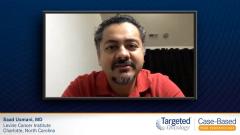
Data Analysis from the Phase 3 MAIA Study
Saad Usmani, MD, analyzes the efficacy and safety data results from the phase 3 MAIA study.
Episodes in this series

Saad Usmani, MD: The MAIA trial was a randomized phase 3 trial in transplant-ineligible patients with an ECOG performance status of 0 to 2. The randomization was the combination of daratumumab, lenalidomide, dexamethasone, compared with the standard-of-care arm of lenalidomide-dexamethasone treatment, which was continued until relapse progression or intolerance with primary end point being PFS [progression-free survival]. Secondary end points were TTP [time to progression], CR [complete response] and single CR rate, MRD [minimal residual disease] negativity rate, PFS, overall survival [OS], as well as overall response rate.
Risk stratification on the trial was done with ISS [insulin sliding scale] staging and the patient’s age. One key element of this clinical trial was that of all 737 patients who were enrolled in the study, 44% of the patients were 75 years or older. This goes in line with what we’re seeing in terms of choices for this particular patient.
The original study was presented and published after a median follow-up of 28 months. And at that time the median PFS for the DRd [daratumumab, lenalidomide, dexamethasone]had not been reached, but for the Rd [lenalidomide, dexamethasone] had been reset at about 32 months. The study had shown more than 3-fold MRD-negativity rates at that time.
The MAIA data were updated at a median follow-up of 48 months at ASH [American Society of Hematology Annual Meeting] recently. Even after 48 months of follow-up, the median PFS on the DRd arm [daratumumab, lenalidomide, dexamethasone] had not been reached, which is quite unprecedented for a newly diagnosed transplant-ineligible study at this point.
And Rd [lenalidomide, dexamethasone] arm showed an improvement in the PFS that was supported with 34½ months with a hazard ratio of 0.54.
The depth of response continued to get better over time. The overall response rate was 93%, with a higher percentage of patients achieving CR and stringent CR in the DRd [daratumumab, lenalidomide, dexamethasone] arm compared with the Rd [lenalidomide, dexamethasone] arm. Looking at the MRD-negativity rates, those 2 continue to get better over time with a median follow-up of 48 months. Now MRD negativity rate on the DRd [daratumumab, lenalidomide, dexamethasone] arm was 31%.
Taking all these data together, I feel that DRd [daratumumab, lenalidomide, dexamethasone] would the best choice for this patient.
Transcript edited for clarity.
Case: A 75-Year-Old Woman With Multiple Myeloma
Initial Presentation
- An active 75-year-old woman presented with new onset back pain and a 10-month history of fatigue, mild sensory neuropathy
- PMH: hypercholesterolemia, diabetes, and atrial fibrillation; all medically controlled
- PE: bony tenderness appreciated on the hips and lower back
Clinical Workup
- Labs: Hb 10.2 g/dL, calcium 11.1 mg/dL, LDH 186 U/L, creatinine 1.3 mg/dL, albumin 3.7 g/dL, beta-2 microgloblulin 3.6 mcg/mL, potassium 1100 g/dL, M-protein 2.6 g/dL, lambda free light chains 4.1 mg/dL
- Hepatitis B and C negative
- X-ray showed L4 vertebral compression fracture
- Skeletal survey showed multiple lytic lesions in femur
- Bone marrow shows 40% clonal plasma cells IgG k with hyperdiploidy FISH
- Diagnosis: R-ISS stage II MM
- ECOG 1
Treatment
- Patient is ineligible for ASCT due to comorbidities
- Initiated treatment with daratumumab + lenalidomide + dexamethasone


















